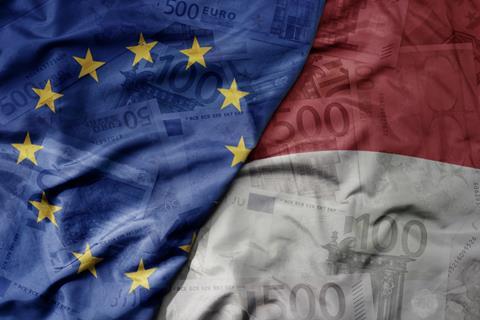The European fresh produce association warns that the EU’s Comprehensive Economic Partnership Agreement with Indonesia may not deliver benefits for fruit and vegetable exporters due to persistent non-tariff barriers and complex regulatory requirements

Freshfel has questioned the benefits of the EU’s new Comprehensive Economic Partnership Agreement (CEPA) with Indonesia, when it comes to fresh produce trade.
The deal aims to eliminate over 98 per cent of tariffs, with key focus areas including cars, pharmaceuticals, electronics, and agri-food products.
However, the association said that the benefits for EU fruit and vegetables exports remain uncertain and subject to unresolved sanitary and phytosanitary (SPS) measures.
”The European fruit and vegetables sector exports around 7mn tonnes of high quality, sustainable and nutritious fruit and vegetables to more than 150 destinations,” Freshfel stated.
”This volume remains however well below its potential and demand given excessive SPS barriers imposed by third countries.
”The recent finalisation of the Comprehensive Economic Partnership Agreement (CEPA) with Indonesia could be an new opportunities for the EU fresh produce business and further market diversification in a buoyant South East Asian markets,” Freshfel noted.
Indonesia is described as a ”highly promising and strategically important” market in the current geopolitical and trade context.
With a population of 286mn, a growing middle class, and GDP growth consistently above 5 per cent, Indonesia offers ”significant opportunities for EU exporters”.
The EU assortment of temperate fruits and vegetables is seen as complementary, the association outlined, and not competing with the local Indonesian production.
”However, access to this market is currently undermined by a series of trade barriers, administrative burdens, discriminatory measures and complex business environment that prevent unleashing the full potential from the EU supply given an unlevelled playing field with competitors, most notably from the Northern Hemisphere – such as China (price competition) and the United States (enjoying more favourable market access conditions),” Freshfel explained.
As a result, European exports are limited to around 20,000 tonnes, worth less than €15mn.
EU fresh produce only represents a small share of the Indonesian import assortment, around 1.5 per cent, with shipments limited to onions and kiwifruit, as well as some sample exports of apples and blueberries.
Freshfel said that, beyond the market access “irritants”, the sector also needs to monitor and to cope with other important commercial aspects for a successful growth of business: negotiating direct, and costs effective reefer logistics; addressing detrimental exchange rate fluctuations; and converting EU sustainability achievements from a handicap to an asset within a global and competitive trade environment.
Upon signing the CEPA, European trade commissioner Maroš Šefčovič underlined that this is a strong signal for openness and partnership in a world facing rising protectionism and fragile supply chains.
Commissioner Christophe Hansen also highlighted a victory for high-quality EU foods and 200 Geographical Indications (GIs).
“These are encouraging steps, but EU external trade should not be limited to cars,” said Freshfel general delegate Philippe Binard.
”When it comes to fresh fruit and vegetables, there’s a critical issue that remains unresolved,” he continued.
“Tariff elimination alone will not improve market access for EU exporters if non-tariff barriers, particularly SPS measures, are not effectively addressed.”
In Indonesia, these barriers are numerous and complex, ranging from costly, lengthy, and fragmented PRA processes (product-by-product, member-state-by-member-state), to a lack of EU-wide recognition for plant health standards.
Freshfel also pointed out that limited laboratory accreditation and opaque licensing and quota systems are failing to generate a business-friendly model, further exacerbated by “discriminatory” port logistics practices.
Despite the EU having common food and plant safety regulations, Indonesia does not recognise the EU as a single entity, and imposes application processes on individual member states.
By contrast, Freshfel said, Indonesia enjoys “seamless” access to the EU’s 450mn consumers for their exports.
“For CEPA with Indonesia to truly deliver its benefit for fresh fruit and vegetables, SPS provisions of the agreement must tackle these systemic issues head-on,” said Binard.
”Let’s see if the SPS provisions of CEPA provide the tools for eliminating these excessive and duplicating measures.
“Otherwise, CEPA tariff concessions on fruit and vegetables will be void and risk becoming an empty gesture, as seen with past FTAs with Mexico, Chile, Peru, South Korea and Japan,” he warned.
”Most of these countries take huge benefit of exporting to the EU markets by too often remaining hermetically closed in breach of basic reciprocity principles.”



